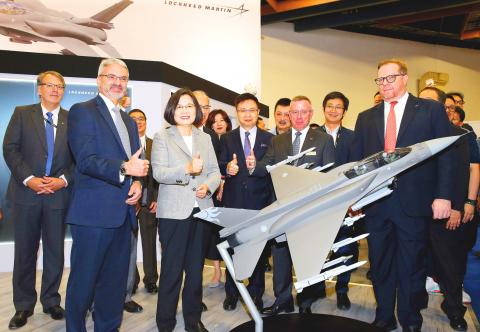President Tsai Ing-wen (蔡英文) yesterday made clear her intention to buy more upgraded F-16 jets from the US and expressed the hope that Washington would reach a decision on the sale, as she tried out an F-16 flight simulator at the opening of the Taipei Aerospace and Defense Technology Exhibition.
Tsai gave a speech at the opening ceremony at the Taipei World Trade Center’s Exhibition Hall 1 and toured the defense pavilion, where she viewed the indigenous Jian Hsiang anti-radiation drone, the Teng Yun medium-altitude long-endurance drone and experienced the F-16 simulator.
“I tried the F-16 simulator a while ago. We need to constantly enhance our air defense capability,” she said in an interview after the tour. “I hope we can have more F-16 jets.”

Photo: CNA
“I also hope that the US government can make a decision after they complete their internal process,” Tsai said.
The Ministry of National Defense made a request to the US in the first quarter of this year to purchase a fleet of advanced F-16V jets to increase Taiwan’s air defense capabilities amid increasing provocation from China.
However, progress appears to have stalled, as US President Donald Trump’s administration had yet to inform the US Congress of the proposed arms sale before it went into recess on July 26, five months after Taiwan made the request.
Some news reports said that this was due to the possible effect the deal would have on US-China relations amid an ongoing trade conflict.
In her speech, Tsai said that after she took office in May 2016, she incorporated the aerospace and defense industries into the “five plus two” innovative industries plan to use the government’s power to boost the private sector’s momentum.
Over the past three years, the government has proceeded with its goal of producing indigenous aircraft, she said, adding that advanced jet trainers in particular need to be domestically manufactured.
“The domestic aerospace industry reached NT$100 billion [US$3.18 billion at the current exchange rate] in 2016 and NT$120 billion last year,” she said.
Overseas firms have continued to place more orders, and the export value of the industry has grown 60 percent, she said, adding that these results show that the domestic aerospace industry is recognized internationally.
American Institute in Taiwan (AIT) Director Brent Christensen, also spoke at the opening, saying that Taiwan-US security cooperation goes beyond arms sales.
The US considers Taiwan a partner in realizing its vision of a “free and open Indo-Pacific,” the two nations’ militaries engage frequently and substantively in professional exchanges, and their authorities collaborate to enhance humanitarian assistance and disaster relief capabilities, he said.
“These investments by Taiwan are commendable, as is Taiwan’s ongoing commitment to increase the defense budget annually to ensure that Taiwan’s spending is sufficient to provide for its own self-defense needs,” Christensen said. “We anticipate that these figures will continue to grow commensurate with the threats Taiwan faces.”

TRAGEDY STRIKES TAIPEI: The suspect died after falling off a building after he threw smoke grenades into Taipei Main Station and went on a killing spree in Zhongshan A 27-year-old suspect allegedly threw smoke grenades in Taipei Main Station and then proceeded to Zhongshan MRT Station in a random killing spree that resulted in the death of the suspect and two other civilians, and seven injured, including one in critical condition, as of press time last night. The suspect, identified as a man surnamed Chang Wen (張文), allegedly began the attack at Taipei Main Station, the Taipei Fire Department said, adding that it received a report at 5:24pm that smoke grenades had been thrown in the station. One man in his 50s was rushed to hospital after a cardiac arrest

A car bomb killed a senior Russian general in southern Moscow yesterday morning, the latest high-profile army figure to be blown up in a blast that came just hours after Russian and Ukrainian delegates held separate talks in Miami on a plan to end the war. Kyiv has not commented on the incident, but Russian investigators said they were probing whether the blast was “linked” to “Ukrainian special forces.” The attack was similar to other assassinations of generals and pro-war figures that have either been claimed, or are widely believed to have been orchestrated, by Ukraine. Russian Lieutenant General Fanil Sarvarov, 56, head

SAFETY FIRST: Double the number of police were deployed at the Taipei Marathon, while other cities released plans to bolster public event safety Authorities across Taiwan have stepped up security measures ahead of Christmas and New Year events, following a knife and smoke bomb attack in Taipei on Friday that left four people dead and 11 injured. In a bid to prevent potential copycat incidents, police deployments have been expanded for large gatherings, transport hubs, and other crowded public spaces, according to official statements from police and city authorities. Taipei Mayor Chiang Wan-an (蔣萬安) said the city has “comprehensively raised security readiness” in crowded areas, increased police deployments with armed officers, and intensified patrols during weekends and nighttime hours. For large-scale events, security checkpoints and explosives

PUBLIC SAFETY: The premier said that security would be tightened in transport hubs, while President Lai commended the public for their bravery The government is to deploy more police, including rapid response units, in crowded public areas to ensure a swift response to any threats, President William Lai (賴清德) said yesterday after a knife attack killed three people and injured 11 in Taipei the previous day. Lai made the remarks following a briefing by the National Police Agency on the progress of the investigation, saying that the attack underscored the importance of cooperation in public security between the central and local governments. The attack unfolded in the early evening on Friday around Taipei Main Station’s M7 exit and later near the Taipei MRT’s Zhongshan